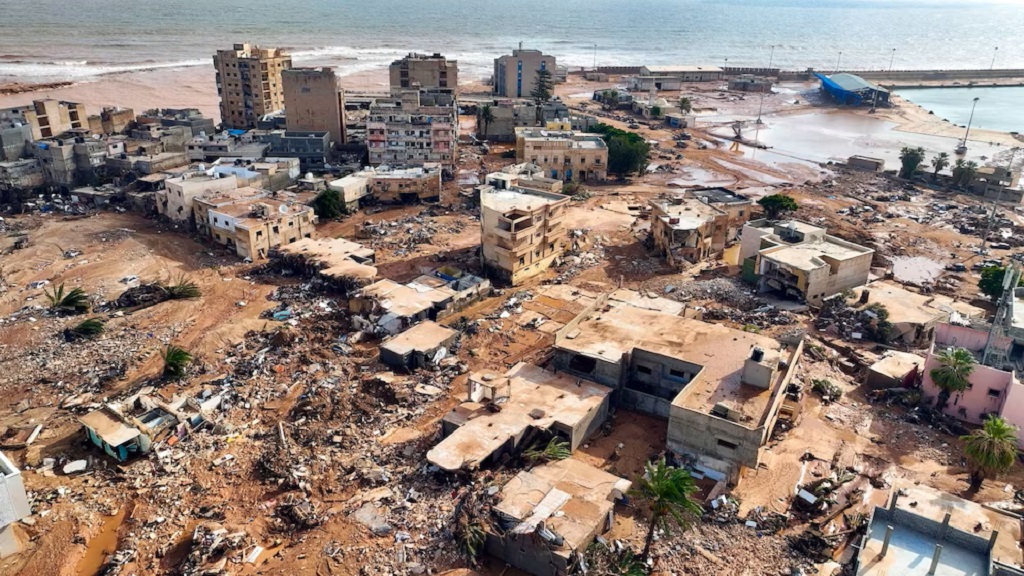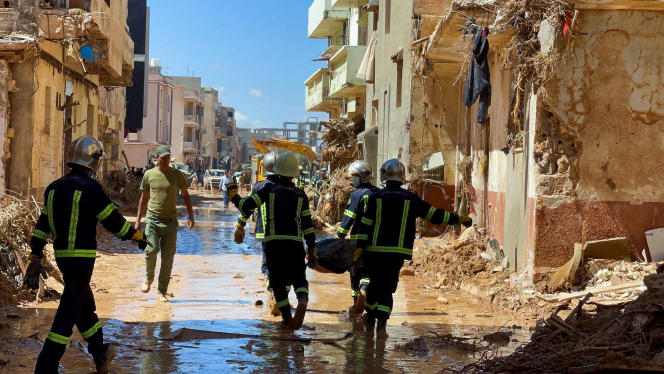Residents and rescue workers in Libya’s ravaged city of Derna were scrambling to cope with thousands of dead washing ashore or decomposing under rubble following a flood that smashed down houses and dragged people out to sea.
The World Health Organisation and other relief organisations have urged Libyan authorities to cease burying flood fatalities in mass graves, claiming that doing so could cause long-term mental pain for families and pose health hazards if positioned near water.
The humanitarian organisations commented after a UN investigation revealed that more than 1,000 dead had been buried in this manner after Libya, a nation divided by a decade of conflict and political upheaval, was slammed by torrential rain from a Mediterranean storm on Sunday.
Countless have died, and countless more have been reported as missing Reuters reports..
“Bodies are littering the streets, washing up on the beach, and buried beneath collapsed buildings and debris.” “One of my colleagues counted over 200 bodies on the beach near Derna in just two hours,” Bilal Sablouh, the ICRC’s regional forensics manager for Africa, said at a press conference in Geneva.
Storm water poured down a normally dry riverbed, destroyed two dams above the city, and brought down entire buildings while families were sleeping in Derna, the epicentre of the destruction in Libya’s east.

According to the International Organisation for Migration mission in Libya, over 5,000 people are assumed dead, with 3,922 deaths recorded in hospitals and over 38,640 people relocated in the flood-ravaged northeastern region.
The death toll in the city of Derna 90,000 could be far higher, UN officials say.
“We should be afraid of an epidemic,” Nouri Mohamed, 60, said inside a bakery that was providing free loaves to help Derna’s devastated population. “There are still bodies beneath the ground….” Now the bodies are starting to smell.”
The United Nations World Health Organisation, in collaboration with the International Committee of the Red Cross and the International Federation of Red Cross and Red Crescent Societies, called for better-managed burials.
“We urge authorities in disaster-affected communities not to rush into mass burials or cremations,” Kazunobu Kojima, medical officer for biosafety and biosecurity in the WHO’s Health Emergencies Programme, said in a statement.
The declaration advocated for clearly marked and documented individual graves, claiming that hurried interments could cause mental suffering for families as well as social and legal issues.
The bodies of trauma victims from natural catastrophes “almost never” constituted a health risk, according to the report, unless they were in or near fresh water supplies, because corpses may leak faeces.

According to a UN study released on Thursday, over 1,000 victims in Derna and over 100 bodies in Al Bayda, another coastal city impacted by flooding, were buried in mass graves.
On Friday, the International Committee of the Red Cross (ICRC) dispatched a cargo jet carrying 5,000 corpse bags to Benghazi, Libya’s main city in eastern Libya. Other forms of assistance have also arrived from abroad.
According to the Norwegian Refugee Council, which has a team of 100 in Libya, the most pressing priority is dead corpse management.
“I’ve heard from my team that there are mass graves where rescue workers are pleading, ‘Don’t bring us food, don’t bring us water, bring us body bags,'” said Ahmed Bayram of the NRC.
Some citizens were dissatisfied that the country’s fragmented authorities were not responding more quickly to assist.
“The state is of no use to us,” said Saad Rajab Mohamed al-Hasi, a 50-year-old security officer from Susah, a town 60 kilometres away that was also flooded. “Now I’m in the street with my children and wife.”
According to UN assistance head Martin Griffiths, Libya needs equipment to find those trapped in muck and destroyed houses during the floods, as well as basic health care to avert a cholera breakout among survivors.
“Priority areas are shelter, food, and key primary medical care due to the fear of cholera and a lack of clean water,” Griffiths explained.
Libya’s Death Toll Surpasses 6,000 In Devastating Floods
Libya’s Death Toll Surpasses 6,000 In Devastating Floods, Urgent Burial Efforts Underway




